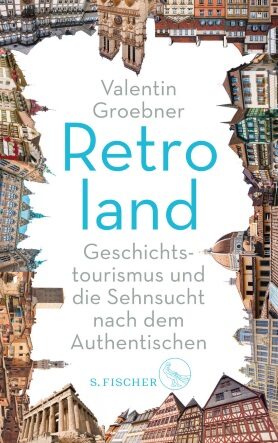Valentin Groebner
Retroland. Geschichtstourismus und die Sehnsucht nach dem Authentischen
[Retroland. Historical Tourism and the Longing for Authenticity]
- S. Fischer Verlag
- Frankfurt am Main 2018
- ISBN 978-3-103-97366-2
- 224 Pages
- Publisher’s contact details
Published in Greek with a grant from Litrix.de.
Sample translations
Paradise, nowhere
"Vacations," declares historian Valentin Groebner, "promise a journey into a past that has been magically preserved." Whether it's untouched nature, historic city centers or authentic inhabitants and their way of life, faraway destinations seem to offer something that's lacking in our own everyday lives and that is "still" present in foreign places. Groebner's equally elegant and readable essay about this sort of "retroland," which is subtitled "Historical Tourism and the Longing for Authenticity," tries to more precisely define those desires that attract us to faraway places and past times.
Why do we want to travel back in time, the author asks himself. When did this start? Modern tourism is around 150 years old and has developed into an enormous service industry, which accounts for ten percent of the world's gross national product. In 2016, every eighth person took a trip somewhere as a tourist. Tourism draws upon the longing for quality time and authenticity. It is "a time recreation machine," Groebner writes, adding, "On vacation, and only then, the time we don't otherwise have is supposed to be given back to us."
The invocation of the authentic functions so smoothly because historical narratives are binding. "They make what is gone forever accessible and allow us to recognize it in the here-and-now," the historian proposes. Over the course of his investigation, Groebner, who was born in 1962 and teaches Medieval and Renaissance History at the University of Lucerne, takes a critical look at the humanities, which thus far have taken only a marginal interest in tourism. In his book "Ego Poster," a history of the face, which was published three years ago, Groebner analyzed the development of self-depictions from the beginning of portraiture to modern photography. In that work, too, he cast a critical eye on the work of historians. In his new book, Groebner doesn't seek to ridicule either the desire for authenticity or the transparently staged aspect of tourism. "I don't want to dismiss what's banal about tourism," he writes. "I want to examine it."
His grand tour of the guaranteed authentic sites of touristic desire begins in the early Renaissance with the Sacri Monti in Piedmont. In a number of churches in that city, the passion play was reconstructed. It is a restaging of history that commenced back in in fifteenth century. The agenda of Sacri Monti was "to render the holy events of the Biblical era visible again. Groebner treats the churches like early amusement parks that allowed people to have intense contact with Biblical tales. It is precisely not a contradiction that around the same time the humanists were rediscovering Antiquity and modern science was developing. Antiquity had to be reconfigured and indeed "performed," Groebner acknowledges. In particular educated people at the time knew that "history is made." For that reason history is always adapted the present.
The historian moves on to analyze the nineteenth-century reinvention of history and especially the Middle Ages from Paris to Lucerne to Constance. The celebration of the Middle Ages as an expression of authenticity had a lot to do with the new nation-states' desire for a suitably respectable past. Monuments were erected everywhere, and the old was repolished into something shiny and new. Groebner convincingly explains "what a relatively new phenomenon the rediscovery of the past is." Its reclamation and presentation as an attraction began in the nineteenth century as an "industrially organized mass phenomenon." Everywhere in Europe, neo-Gothic or neo-Baroque buildings were constructed. They were all fakes – a trend that continued into the twentieth century. The fact that many of these landmarks, for instance, Lucerne's Chapel Bridge, are today revered for their "self-confident artificiality," which affirms people's search for authenticity. "Simulation offers orientation," Groebner writes. Ultimately it's is artificiality that promises to be most natural.
The author allows his own experiences to feed into his analysis of touristic self-invention. He goes on an Ayurveda course in Sri Lanka and visits a Mediterranean Spanish beach he knew from the 1980s. In the process, it becomes evident that modern identities are determined to a great degree by the choice of "suitable" pasts. And because the past is beyond reach, it must be continually sought out and visited on ever new trips. The irony is that the sites of our desires are often less than overwhelming when we actually reach them. The book closes with a final one-liner. "You see," the author explains to his daughter on a lovely Greek vacation island. "Paradise is boring."
Translated by Jefferson Chase

By Jutta Person
Jutta Person, born 1971 in South Baden, studied German, Italian and Philosophy in Cologne and Italy, and gained a doctorate with a dissertation on the history of physiognomy in the 19th century. A journalist and cultural commentator, she is based in Berlin and writes for the Süddeutsche Zeitung, Die Zeit and Philosophie Magazin. From 2004 to 2007 she was an editor at Literaturen; since 2011 she has been in charge of the books section at Philosophie Magazin.
(Updated: 2020)
Publisher's Summary
Clever, feather-light essays about people’s fascination with traveling into the past - historical tourism is in fashion. But why? What are we looking for in "Retroland"?
Historic old towns decorated with geraniums, colonial idylls on tropical islands and quaint Alpine villages: journeys to places where time has supposedly stood still are the everyday business of tourism. The renowned historian Valentin Groebner investigates the hotspots of historical tourism - which astoundingly have existed for 500 years! He takes his readers on a journey to Piedmont and Paris, to the mountains and picturesque beaches, romantic Lucerne and picturesque Sri Lanka.
The actual raw material of the tourism industry, he shows, is not culture, sun and landscape. It is the promise of finding paradise, but also one's own origins, authentic and unadulterated. Yet as Valentin Groebner shows, nothing is what it seems, or as the travel guide claims. The old that is worth seeing must be constantly recreated and adapted to meet our expectations. So welcome to the time machine, to the fair of "historical identities": all aboard, back to the future!
(Text: S. Fischer Verlag)
